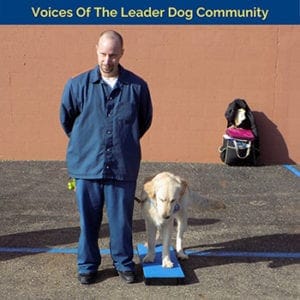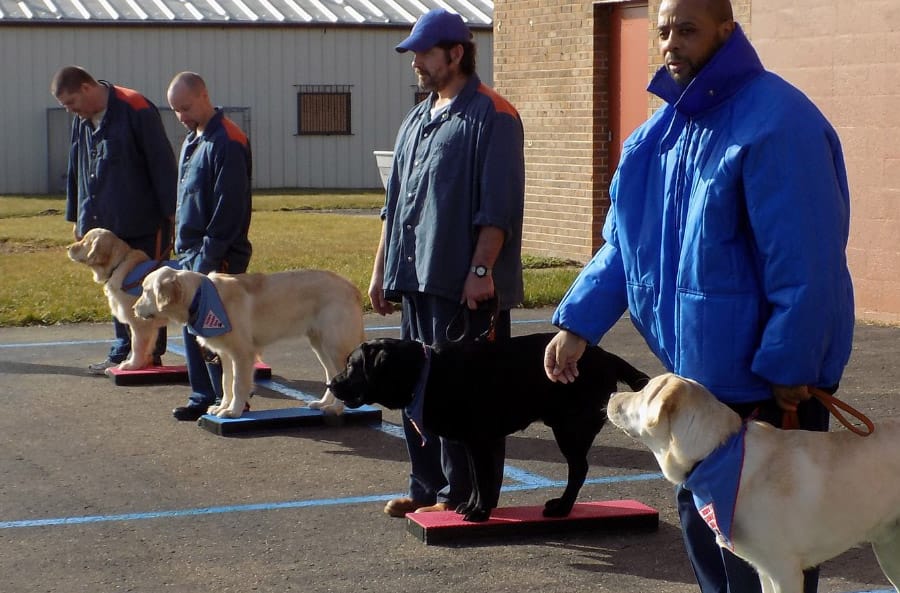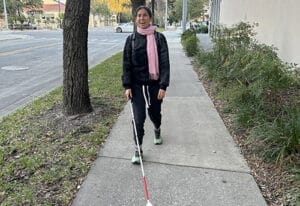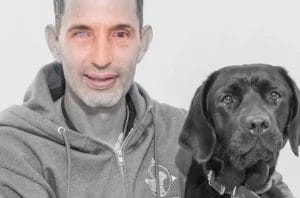Part 1: Introduction
My name is Troy and I have just been paroled after serving 22 years within the Michigan Department of Corrections (MDOC). A major part of my personal growth came through participating in Leader Dog’s Prison Puppies initiative. I feel a responsibility to share with others how meaningful this program is for those incarcerated.
Some in the Leader Dog Community might not be familiar with how Prison Puppies works, so here are the basics:
Every prison facility operates a little bit differently based upon the administration running it. However, every facility screens someone before they are allowed into the program. Once approved by the facility, the person waits for an opening before being assigned to a puppy raising team. Once a position opens and the person gets an okay from Leader Dog, they begin their puppy raising journey!
 Each team usually consists of two people and a puppy. One person signs the contract, just like they do in society, and the other member is listed as a secondary handler. Some facilities have three-person teams where inmates are housed in “cubes.” Cubes are like office cubicles, but these are in pole barns. I started puppy raising in a cube but finished in a cell with one other person and our assigned puppy.
Each team usually consists of two people and a puppy. One person signs the contract, just like they do in society, and the other member is listed as a secondary handler. Some facilities have three-person teams where inmates are housed in “cubes.” Cubes are like office cubicles, but these are in pole barns. I started puppy raising in a cube but finished in a cell with one other person and our assigned puppy.
The three-person team I began on was with two strangers who later became good friends. Puppies do that; they bring people together from different social settings, cultures, races, you name it. My first puppy was a silly little 3-month-old golden retriever named Truth! I loved it! As the third person on the team, it was my job to absorb everything I was being taught by my teammates, “E” and “T-Mac.”
All three of us were disciplined, dedicated and competitive, which made us a good team. We wanted to be good at everything that we did, whether it was puppy raising, college or sports. Guys like us push ourselves abnormally hard towards success. Our dedication resulted in raising obedient, well-mannered puppies for Leader Dog.
Most of the guys in the program have become phenomenal people through the hardship of incarceration. There are things common to many of our stories, so I’ll share some of them.
Sidenote: Prisons are overcrowded. The cubes were originally intended to be temporary pole barn settings with each cube only housing 4 people. Now that number has doubled to 8 – a sad fact that has come to light again when COVID-19 began spreading inside the facilities.
Part 2: About the Prisoners
Those of us who have committed crimes live with that one moment defining us for the rest of our lives. We did something that hurt others and must own it. Once we do, we have to figure out how to move on. In many cases, even though most of us are guilty of committing crimes, overzealous prosecutors and judges have made overcoming our experiences more difficult by stating things on the record that are simply false. When this happens – and it often does – it becomes common for the ones who committed the crime to develop victim mindsets. These mindsets become habitual through the systemic mistreatment by the system. Sadly, our minority communities know this challenge all too well.
Yet, to be successful at rehabilitation, the victim mindset must be overcome. Not only do returning citizens have to face their criminal records now, but they must face the lies and exaggerations within the narratives of their stories. Many assume judges and prosecutors are honest and upstanding, but the reality is that they are just like everyone else – humans with character flaws. As we mature in prison, we eventually shed our victim mindsets and realize that the lies and exaggerations used by the system are simply ways for those who manipulate it to hurt us back. Some were our victims, some are state employees who disdain inmates, but either way we have no one to blame but ourselves! Once we confront that truth within, it becomes easier to ignore the common mistreatment that we all face during the various stages of incarceration. Most of the time we caused the situations to begin with!
Part 3: Proving Our Value
As prisoners, when we overcome the initial impact of our crime, get sentenced and sent to prison, we usually begin turning our lives around. As we do, we carry huge chips on our shoulders! By committing crimes, we placed ourselves in a marginalized social group. Because of this, we work extra hard to pull ourselves back up. Though often unspoken, we live like we have something to prove, BECAUSE WE DO! We live to prove our worth to ourselves, to each other, and ultimately to society. Prison puppy raising gives us an opportunity to prove our value to everybody else.
 Over time we work to regain the trust of those close to us and meet new people. Eventually we discover that our experiences, though painful, forged exceptional qualities that have a powerful ability to assist humanity in ways that only the marginalized can. There are many good people in prison who have discovered for themselves that they have become exceptional. For downcast people, the challenge is overcoming a negative self-image. However, once prisoners realize they have something valuable to offer because of their experiences, they have a social impact that the average person doesn’t seem to have. Most prison puppy raisers are people who have become, or are becoming, exceptional in comparison to the average person in society. They become inspiring people, they’re my people, and I love them!
Over time we work to regain the trust of those close to us and meet new people. Eventually we discover that our experiences, though painful, forged exceptional qualities that have a powerful ability to assist humanity in ways that only the marginalized can. There are many good people in prison who have discovered for themselves that they have become exceptional. For downcast people, the challenge is overcoming a negative self-image. However, once prisoners realize they have something valuable to offer because of their experiences, they have a social impact that the average person doesn’t seem to have. Most prison puppy raisers are people who have become, or are becoming, exceptional in comparison to the average person in society. They become inspiring people, they’re my people, and I love them!
Just that one statement – that prisoners become inspiring people – will bring out the haters! Prisoners face that daily. There are people who will always hate anything positive that prisoners do with their lives. If the victim mindset isn’t overcome, the haters will continue to stifle the growth of an inmate. Overcoming suppressive people is a challenge common to every incarcerated individual in the United States. The very nature of incarceration is to suppress.
Many of the guys in the Leader Dog program have already proven to be exceptional before being allowed in and some carry the potential to be. If a prisoner makes it into Prisons Puppies, somebody already saw potential in that individual. From my perspective, raising puppies in prison is just as much about the prisoners raising them as it is about the puppies. Everyone, if not harmful to others, deserves a chance to grow. The program helps us exchange our victim mindsets for growth mindsets as we grow with our puppies!
I met many exceptional people in the 4 ½ years I spent raising puppies in prison. All of them became my teachers. Yet, I want to thank the ones I recently left. Every single one of them are unique, valuable and worthy to teach. When we live together in such close quarters with our puppies, we always learn from each other.
These are the teams I just left:
Huck & Wood, Stew & JX, Ghost & D, Rick & John, Jason & Tommy, JR & Arnold, Opie & Slow, Bas & Miles, Tim & Tiger, D & Chat, Big Danish & Joe, Mark & E, Dr. Fu & Dave, Rio & Chris.
Thanks guys! Don’t lose sight of the big picture! Keep being exceptional!
Thank you for joining us today to listen to a Voice of the Leader Dog Community! You can continue with part 2 of Troy’s story here.




